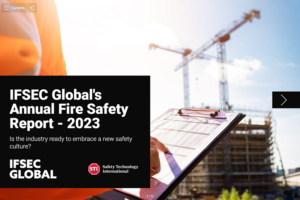Said to be an important step forward for service providers and end-users of fire and security remote services, Euralarm’s Services Section has passed a vote on EN 50710, which specifies the requirements for the provision of secure remote services for fire safety and security systems.
The standard is designed to provide more certainty and embrace the future in which remote services are expected to play an increasingly important role. Industry commentators have, for some time, pointed towards the need for industry standards to catch up with the pace of technological change, whereby remote servicing of systems has been identified as providing many benefits to all stakeholders – highlighted during the COVID pandemic.
EN 50710 covers the requirements for the provision of secure remote services via a remote access infrastructure, so that end-users and service providers can take advantage of the technological developments within the industry.
With the acceptance as a European Norm, Euralarm believes the standard should be ready for publication in early 2022, after which the implementation in the respective countries will begin.
Jon Könz, Chair of Euralarm’s Services Section said: “It is an excellent result and an advancement for the fire safety and security industry. We would like to thank those who helped in the CEN/CENELEC JTC4/WG1 and who contributed to the ‘yes’ of 95% of the countries that could bring out a vote.”
It has been common practice for many years to monitor the alarm and fault status of fire safety and security systems (FSSS) installed in premises from remote locations. Technological developments, as well as the telecommunication paths now available, permit remote access to those FSSS with a wide variety of available functions including full operation and programming as if an authorised person was on-site.
Remote service supplements the on-site visits of a competent person and enables new possibilities for customers (end-users), believes the Euralarm membership.
Euralarm’s Mr. Bernd Giegerich, the convenor of WG1 said: “The overall service quality offered by the various types of professional services providers at the time of installation, maintenance or operation increases significantly. On one hand, end-users experience faster response times leading to higher system reliability and availability. On the other hand, service providers can provide new services such as predictive maintenance, which also improves staff utilisation.”
“A common ground for stakeholders”
Not all countries have industry standards for the use of remote access, which are crucial for end-users and service providers.
Jon continued: “With the arrival of this new European Norm, there will be a robust criteria against which remote services will be measured. Further, it will contribute to overcoming any hesitation about design requirements and strict operational procedures that are fundamental in avoiding actions such as unintended deactivation of parts of an FSSS.”
Bernd adds: “Apart from giving a framework for service providers, there are also the manufacturers who will benefit from the new standard. Certain manufacturers might go directly with their services. For instance, updates can now be done by the manufacturers themselves or in consultation with the system integrator. And, for services providers there is the additional benefit of having a structure to explain to their customers what they can expect.
In short, it will bring more clarity for the market on the provision and use of remote services, as well as more transparency on what a client can expect from a service provider.”
The pan-European approach of remote services is in line with the key objective of the European Services Directive in making provisions for cross-border services. It is important to outline that the EN 16763 (Services standard for fire safety and security systems) is referenced in the EN 50710. The EN 16763 is applied in conjunction with installation guidelines, either European (if any) or national, as well as with national laws and regulations in the field of the systems. It sets the foundation for quality in services provision and is so an important basis for the EN 50710.
2023 Fire Safety eBook – Grab your free copy!
Download the Fire Safety in 2023 eBook, keeping you up to date with the biggest news and prosecution stories from around the industry. Chapters include important updates such as the Fire Safety (England) Regulations 2022 and an overview of the new British Standard for the digital management of fire safety information.
Plus, we explore the growing risks of lithium-ion battery fires and hear from experts in disability evacuation and social housing.

